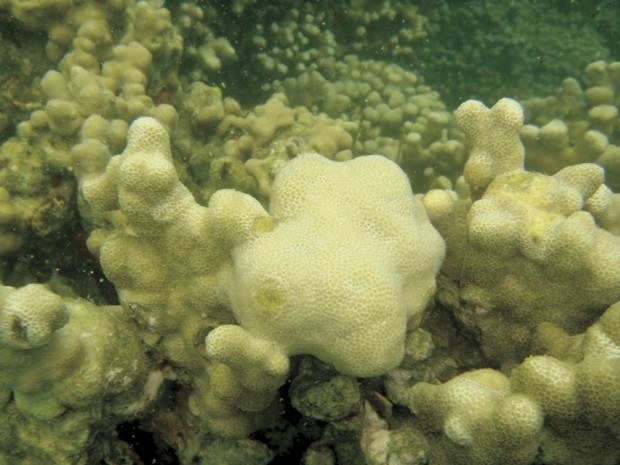PRINCEVILLE — Whether a recreational ocean user, recreational or commercial fisherman, tourism operator, researcher or student, you can help keep an eye out for signs of change when visiting Hawai‘i’s reefs. The Eyes of the Reef Network is a group
PRINCEVILLE — Whether a recreational ocean user, recreational or commercial fisherman, tourism operator, researcher or student, you can help keep an eye out for signs of change when visiting Hawai‘i’s reefs.
The Eyes of the Reef Network is a group of trained community members who know how to provide reliable reports on bleaching, disease and changing reef conditions throughout Hawai’i, including invasions by Crown-of-Thorns Sea Stars and other problematic marine invasive species.
The Eyes of the Reef workshop is for all ocean swimmers, snorkelers and divers, anglers and others who use water for recreation or industry. The workshop produces a network of observers that provide reports on conditions for managers to act on early to address problems as they happen throughout the region.
Students from the Kaua‘i Community College Oceanography class attended the Eyes of the Reef community workshop held at the St. Regis Princeville on Dec. 1.
The workshop is organized by Capt. Paul Clark, president of Save Our Seas, director of the Young Voyagers Club at the St. Regis Princeville, and Kaua‘i Island Coordinator for the Eyes of the Reef Reporting Network. The Oceanography class is taught by SOS founder Dr. Carl Stepath.
“I really enjoyed what I learned at the St. Regis when Paul Clark presented Eyes on the Reef’s level 1 coral awareness class,” said Jane Dulaney of Reef Guides Hawai‘i. “It was beneficial for me as a reef guide to have tools for evaluating the condition of the reef I see everyday.”
SOS POP was created to replicate the University of Hawai‘i QUEST (Quantitative Underwater Ecological Survey Techniques) to prepare young students for futures in marine science, oceanography. It is also used to prep student for the UH scientific diver system, from beginning swimming and snorkeling lessons to fish identification, data collection, and beyond.
The instruction covers the impact of pollution, climate change, and poor land use practices, and how these environmental conditions cause coral disease and bleaching, and support the spread of invasive species that threaten reef health.
“Thanks for the collaboration efforts of Save Our Seas and Eyes on the Reef,” said Steve Cole, a student in the KCC Marine Option Program. “It teaches us about diseased coral and Ho we can report it to the Hawai‘i Institute of Marine Biology.”
The goal of the program is to get more concerned and interested people involved and trained to help spot problems and changes that occur along Kaua‘i’s reefs. Early detection of reef problems is important in protecting reef resources.
“Mahalo to the St. Regis resort who graciously let us use their bar for the class and also Carl Stepath my professor who urges us to learn more about protecting our reef,” he added. “The OCN201 class I am currently taking at KCC is a great way to learn more about our ‘backyard’, the ocean. There is still room in this class for the Spring semester.”
Clark earned his bachelor’s degree from the University of Hawai‘i at Hilo in marine science. He has collected data on coral reefs on Kaua‘i and Hawai‘i Islands during a decade as a diver working with research teams on Marine Protected Areas in Kona and Hilo.
The experience motivated Clark to become interested in marine disease and threats to reefs. This passion led to an opportunity to share this information with the community through the Eyes of the Reef.
Clark was a Kula High and Kaua‘i Pacific School teacher for the past decade. He is currently working as a mentor with two Kapa‘a High School students on Eyes on the Reef Project Ocean Pulse for pre K-12 students and community training.
“We appreciate the willingness of the St. Regis to host an event like this,” Clark said. “Over the years they have helped promote marine education and conservation by providing an amazing venue for ocean users to gather. The Reef in front of the hotel is unique in many ways and by learning how to recognize changes on this reef and others across the island we can hope to keep our reefs healthy.”
As Clark completes work on organizing a workshop for high school students in the near future, he is open to organizing workshops for large community groups and diving organizations.
“If groups are interested they can get in touch with me and if is big enough we can do a special training,” Clark said.
To learn more about Eyes of the Reef contact Paul Clark at 651-3452 or sos@saveourseas.org. Write to PO Box 813, Hanalei, HI 96714, or visit online at www.reefcheckHawaii.org/eyesofthereef.htm and www.saveourseas.org.



